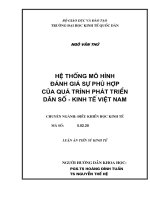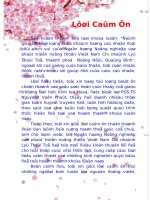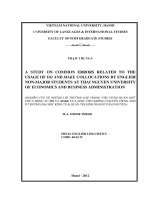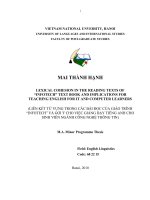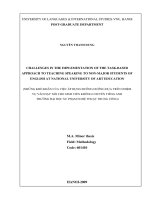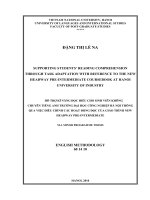ĐÁNH GIÁ SỰ PHÙ HỢP CỦA GIÁO TRÌNH NEW ENGLISH FILE ĐỐI VỚI VIỆC GIẢNG DẠY SINH VIÊN KHÔNG CHUYÊN NGỮ TẠI TRƯỜNG ĐẠI HỌC KHOA HỌC – ĐẠI HỌC THÁI NGUYÊN
Bạn đang xem bản rút gọn của tài liệu. Xem và tải ngay bản đầy đủ của tài liệu tại đây (1.5 MB, 8 trang )
<span class='text_page_counter'>(1)</span><div class='page_container' data-page=1>
<b>Tập 167, số 07, 2017</b>
Tập 167
, Số
07
</div>
<span class='text_page_counter'>(2)</span><div class='page_container' data-page=2>
<i><b> </b></i>
<b>Tạp chí Khoa học và Công nghệ</b>
<b>CHUYÊN SAN KHOA HỌC XÃ HỘI – NHÂN VĂN – KINH TẾ</b>
<b>Môc lôc </b> <b>Trang</b>
<b>Nguyễn Đại Đồng - Hoạt động khai thác mỏ ở Lào Cai dưới thời Gia Long và Minh Mệnh </b> 3
<b>Dương Thị Huyền - Thương mại châu Âu và những tác động đến tình hình chính trị Đàng Trong thế kỷ XVI- XVIII </b> 9
<i><b>Trần Thị Nhung - Miêu tả tình tiết trong Truyện Kiều và Kim Vân Kiều Truyện </b></i> 15
<i><b>Nguyễn Thị Hải Phương - Bản chất của ngôn từ văn học (nghĩ từ bài viết Bản chất xã hội, thẩm mỹ của diễn </b></i>
<i><b>ngôn văn học của Trần Đình Sử) </b></i> 21
<b>Phạm Thị Mai Hương, Nguyễn Thị Thu Trang, Ngô Thị Lan Anh - Ảnh hưởng của lễ hội Vu Lan đến đời </b>
sống đạo đức của nhân dân huyện Quốc Oai, Hà Nội 25
<b>Phạm Thị Ngọc Anh - Hình tượng văn thủy ba trong mỹ thuật cổ Việt Nam và các ứng dụng trên sản phẩm mỹ </b>
<i>thuật tạo hình hiện đại </i> 31
<b>Trương Thị Phương - Giải pháp ứng dụng hiệu quả thông tin đồ họa trên báo điện tử </b> 37
<b>Phạm Thị Nhàn - Ẩn dụ từ vị giác “ngọt” trong tiếng Hán hiện đại </b> 43
<i><b>Lương Thị Thanh Dung – Sự khác nhau về kết cấu chữ Nôm của văn bản Thiền tông bản hạnh giữa bản in </b></i>
<b>năm 1745 và bản in năm 1932 </b> 49
<b>Nguyễn Thị Quế, Phạm Phương Hoa - Đánh giá sự phù hợp của giáo trình New English File đối với việc </b>
<b>giảng dạy sinh viên không chuyên ngữ tại Trường Đại học Khoa học – Đại học Thái Nguyên </b> 55
<b>Hoàng Thị Thắm - Nghiên cứu về siêu nhận thức trong nghe tiếng Anh của sinh viên chương trình tiên tiến tại </b>
<b>Trường Đại học Kỹ thuật Công nghiệp – Đại học Thái Nguyên </b> 61
<b>Nguyễn Quỳnh Trang, Dương Công Đạt, Vũ Kiều Hạnh - Thiết kế chương trình bổ trợ nói cho học sinh lớp </b>
<b>10 Trường Trung học Phổ thông Thái Nguyên </b> 67
<b>Nguyễn Khánh Như - Sự phát triển của hệ thống các trường đại học sư phạm trọng điểm Trung Quốc hiện nay </b> 73
<b>Nguyễn Văn Hồng, Vũ Thị Thanh Thủy - Dạy học theo dự án và vấn đề phát triển năng lực nghiên cứu khoa </b>
học cho học sinh trong dạy học Sinh thái học ở trung học phổ thông 79
<b>Trần Thị Phương Thảo, Nguyễn Thị Hoa Hồng - Nâng cao tính ứng dụng trong xây dựng chương trình đào </b>
tạo đại học tại Việt Nam – bài học từ chương trình giáo dục đại học định hướng nghề nghiệp ứng dụng (POHE) 85
<b>Phạm Thị Bích Thảo, Nguyễn Thành Trung - Lựa chọn bài tập thể lực chuyên môn nâng cao kết quả học tập </b>
<b>chạy cự ly ngắn cho sinh viên khóa 14 Trường Đại học Khoa học - Đại học Thái Nguyên </b> 91
<b>Lê Huy Hoàng, Nguyễn Thị Huyền, Nguyễn Thị Ngân, Vũ Thị Vân Anh - Phát triển năng lực sử dụng ngơn </b>
ngữ hóa học của học sinh phổ thông trong dạy học các nội dung về hóa học hữu cơ chương trình hóa học lớp 12
<b>nâng cao </b> 97
<b>Nguyễn Trọng Du - Phỏng vấn ‘nhóm tập trung’: một phương pháp thu thập dữ liệu hiệu quả với các nghiên </b>
<i>cứu khoa học xã hội </i> 103
<b>Đỗ Thị Thái Thanh, Trương Tấn Hùng, Đào Ngọc Anh - Xây dựng hồ sơ năng lực bồi dưỡng giáo viên thể </b>
<b>dục các trường trung học phổ thơng các tỉnh miền núi phía Bắc </b> 109
<b>Nguyễn Ngọc Bính, Dương Tố Quỳnh, Nguyễn Văn Thanh - Thực trạng sử dụng hệ thống phương tiện </b>
chuyên môn trong giảng dạy mơn bóng chuyền cho sinh viên Trường Đại học Kinh tế và Quản trị Kinh doanh -
<b> Đại học Thái Nguyên </b> 115
<b>Lê Văn Hùng, Nguyễn Nhạc - Giải pháp nâng cao hiệu quả hoạt động câu lạc bộ bóng đá nam sinh viên </b>
<b>Trường Đại học Sư phạm – Đại học Thái Nguyên </b> 119
<b>Journal of Science and Technology </b>
167
(07)
</div>
<span class='text_page_counter'>(3)</span><div class='page_container' data-page=3>
<b>Nguyễn Văn Dũng, Lê Văn Hùng - Một số giải pháp giúp sinh viên lựa chọn mơn học tự chọn trong chương </b>
trình giáo dục thể chất dành cho sinh viên không chuyên thể dục thể thao Trường Đại học Sư phạm – Đại học
Thái Nguyên 125
<b>Nguyễn Văn Chiến, Nguyễn Trường Sơn, Đỗ Như Tiến - Một số kết quả ban đầu trong việc áp dụng CDIO </b>
<b>để xây dựng chuẩn đầu ra của chương trình đào tạo tại Đại học Thái Nguyên </b> 131
<b>Đỗ Quỳnh Hoa - Vận dụng tư tưởng Hồ Chí Minh vào việc xây dựng lối sống cho sinh viên Trường Đại học </b>
<i><b>Công nghệ Thông tin và Truyền thông – Đại học Thái Nguyên trong giai đoạn hiện nay </b></i>135
<b>Phạm Văn Hùng, Nguyễn Huy Hùng - Đánh giá đầu ra của chương trình đào tạo qua mức độ đáp ứng chuẩn </b>
<b>đầu ra của sinh viên chuẩn bị tốt nghiệp </b> 141
<b>Ngô Thị Lan Anh, Nguyễn Thị Thu Hiền - Yêu cầu khách quan của việc đổi mới quy trình kiểm tra đánh giá </b>
kết quả học tập môn giáo dục công dân ở trường trung học phổ thông nước ta hiện nay 147
<b>Trương Thị Thu Hương, Trương Tuấn Anh - Ứng dụng dạy học dự án trong đào tạo giáo viên kỹ thuật tại </b>
<i>Trường Đại học Kỹ thuật Công nghiệp - Đại học Thái Nguyên </i> 153
<b>Dương Quỳnh Phương, Trần Viết Khanh, Đồng Duy Khánh - Những nhân tố chi phối đến văn hóa tộc người </b>
<b>và văn hóa cộng đồng dân tộc dưới góc nhìn địa lí học </b> 159
<b>Nguyễn Thị Thanh Tâm, Trần Quyết Thắng, Đào Thị Hương - Đánh giá mức độ hài lòng của khách du lịch </b>
đối với đội ngũ hướng dẫn viên du lịch tại một số công ty kinh doanh lữ hành trên địa bàn thành phố Thái
<b>Nguyên </b> 165
<b>Nguyễn Văn Chung, Đinh Hồng Linh - Các yếu tố thành công cho website thương mại điện tử: trường hợp </b>
<b>doanh nghiệp du lịch nghỉ dưỡng vừa và nhỏ ở Quảng Bình </b> 171
<b>Đặng Thị Bích Huệ - Dự án hỗ trợ nơng nghiệp, nông dân và nông thôn tỉnh Tuyên Quang và các tác động đến </b>
<b>đời sống người dân trên địa bàn xã Minh Quang, huyện Chiêm Hóa, tỉnh Tuyên Quang </b> 177
<b>Lương Văn Hinh, Lương Trung Thuyền - Nghiên cứu biến động giá đất ở trên địa bàn thị trấn Thất Khê, </b>
<b>huyện Tràng Định, tỉnh Lạng Sơn giai đoạn 2011 – 2015 </b> 183
<b>Nguyễn Tú Anh, Nguyễn Thị Lan Anh, Nguyễn Thành Minh - Nghiên cứu các mối quan hệ cung ứng dịch </b>
vụ quản trị hoạt động có dịch vụ trách nhiệm xã hội: trường hợp điển cứu tại các công ty dịch vụ vận tải chở
khách vừa và nhỏ trên địa bàn tỉnh Thái Nguyên 189
<b>Nguyễn Thị Thu Thương, Hoàng Ngọc Hiệp - Thực trạng quản lý vốn ngân sách nhà nước cho đầu tư phát </b>
triển cơ sở hạ tầng nông nghiệp tỉnh Thái Nguyên 193
<b>Tạ Thị Thanh Huyền, Nguyễn Mạnh Dũng - Tăng cường quản lý vốn đầu tư xây dựng cơ bản từ ngân sách </b>
nhà nước trên địa bàn tỉnh Thái Nguyên 199
<b>Nguyễn Thị Kim Huyền - Ứng dụng chuẩn mực báo cáo tài chính quốc tế (IFRS): kinh nghiệm quốc tế và bài </b>
học cho Việt Nam 205
<b>Nguyễn Thị Nhung, Phan Thị Vân Giang - Tạo động lực cho các doanh nghiệp thuộc thành phần kinh tế tư </b>
nhân đầu tư trực tiếp ra nước ngoài 211
<b>Phạm Thuỳ Linh, Phạm Hoàng Linh, Trần Thị Thu Trâm - Xuất khẩu hàng dệt may của Việt Nam trong bối </b>
<b>cảnh hội nhập mới </b> 219
<b>Nguyễn Thị Thu Trang, Trần Bích Thủy - Động lực làm việc của cán bộ công chức xã phường: nghiên cứu </b>
<b>điển hình tại thành phố Thái Nguyên </b> 225
<b>Nguyễn Thu Thủy, Hoàng Thái Sơn - Bài học kinh nghiệm trong quản lý rủi ro thanh khoản đối với Ngân </b>
<b>hàng Thương mại Cổ phần Á Châu </b> 231
<b>Ngô Thúy Hà - Định hướng phát triển dịch vụ tín dụng cho hệ thống ngân hàng thương mại Việt Nam đến năm 2020 </b> 237
</div>
<span class='text_page_counter'>(4)</span><div class='page_container' data-page=4>
<i>Nguyễn Thị Quế và Đtg </i> Tạp chí KHOA HỌC & CƠNG NGHỆ 167(07): 55 - 59
55
<i>EVALUATION ON THE SUITABILITY OF THE NEW ENGLISH FILE </i>
TEXTBOOKS IN AN EFL TEACHING CONTEXT
Nguyen Thi Que*, Pham Phuong Hoa
<i>University of Sciences - TNU</i>
<i> </i>
SUMMARY
Textbooks have been a subject of hot debates in education. A wide array of issues related to
textbooks has been highlighted in recent years and evaluating textbooks is one of the most striking
matters which should be adequately addressed. This article presents an evaluation of a language
textbook in a specific institutional context. It uses descriptive research design to investigate the
perception of the ten educators on the level of suitability of the New English File Textbooks to
non-English major students at Thai Nguyen University of Sciences, Vietnam. Results from the
study will serve as the basis for proposing changes and suggesting recommendations regarding
teaching methods and material adaptation that could enhance the quality of English learning and
teaching at an EFL context.
<i>Key words: evaluation, suitability, New English File Elementary and Pre-intermediate, </i>
<i>non-English major students, Thai Nguyen University of Sciences. </i>
INTRODUCTION *
Textbooks are “an effective resource for
self-directed learning, an effective resource for
presentation material, a source of ideas and
activities, a reference source for students, a
syllabus where they reflect pre-determined
learning objectives, and supports for less
experienced teachers who have yet to gain in
confidence” [2]. This means textbooks play a
pivotal role in guiding teachers and learners
to obtain the goals of language teaching and
learning. In Vietnam, textbooks can be
considered a powerful instrument and
backbone for classroom activities.
Located in the Northeast of mountainous
area in Vietnam, Thai Nguyen University of
Sciences (TNUS) has some striking features
which are typical of the region. There
remains a gap in evaluating language
textbooks although they are considered a
great tool in English education. What is
more, the remarkable proportion of the
students is of different minor ethnic groups
with poor educational background. They are
mainly non-English majored; so they
demonstrate lack of motivation and a low
level of English language proficiency. The
*
<i>Tel: 0963888288; Email: </i>
majority of tertiary institutions in Vietnam
also face the similar challenges.
A good signal which is supposed to help solve
the above educational woes is the launch of
the National Foreign Language 2020 Project
(NFLP 2020) by Ministry of Education and
Training of Vietnam in 2010 [3]. The
implementation of NFLP 2020 has made
dramatical changes in English education in
Vietnam. In order to actualize the NFLP2020,
Thai Nguyen University (TNU) Director
signed the approval of “Project on
standardizing language skills for TNU
academic staffs and students of the 2013-2015
and the 2016-2020 periods" in 2014. Under
this project, it is a compulsory requirement
that non-English major students (graduating
from the academic year of 2018 onwards)
have to achieve level B1 in the Common
European Framework of References (CEFR)
or have B1 equivalent certificates in English
in order to graduate from any bachelor
training programs [4].
</div>
<span class='text_page_counter'>(5)</span><div class='page_container' data-page=5>
<i>Nguyễn Thị Quế và Đtg </i> Tạp chí KHOA HỌC & CƠNG NGHỆ 167(07): 55 - 59
56
“textbook is perfect” for all context [1].
Therefore, an attempt to carry out a critical
evaluation on these materials is crucial to
formulate the principles for their quality
improvement and further development through
corrections, revisions, and adaptations.
With the above-mentioned concerns,
“Evaluation on the Suitability of the New
<i>English File (NEF) Textbooks in an EFL </i>
Teaching Context” has come into conception
with the main aims of investigating strengths
and weaknesses of NEF textbooks and their
compatibility with the intended learning
outcomes as seen from the point of view of 10
TNUS educators. From that, some
suggestions are going to be proposed to
promote the effective uses of these materials
to help students to achieve level B1 as a
compulsory requirement of graduation.
METHODOLOGY
The research employed the descriptive
method to find out educator respondents’
perceptions on the suitability of the currently
used textbooks of New English File
Elementary and Pre-intermediate levels to
non-English major students and to the course
intended learning outcomes at Thai Nguyen
University of Sciences.
The respondents of this study were 10 tertiary
educators working full time and part-time at
the Faculty of Basic Sciences of Thai Nguyen
University of Sciences, Vietnam. Descriptive
design endeavors to illustrate and interpret the
situation of the research. In this study, it was
used to describe the respondents’ profile,
perceptions on the suitability of
teaching-learning contents of NEF to TNUS students
and to the course outcomes.
Due to the time constraints, the research
instrument used in the study is a self-made
questionnaire to seek for the English
educators’ insights on the suitability of the
coursebook in their teaching contexts. The
first part consisted of the respondents’
demographics, followed by the evaluation on
the teaching-learning contents of the
textbooks New English File and the last part
is the evaluation on the suitability of the
textbooks using the Likert’s scale rating.
The data gathered were described statistically
using percentage, frequency for respondents’
profiles and mean and standard deviation for
perceptions on teaching-learning contents and
suitability of the textbooks to the target
students and courses.
FINDINGS
The respondents’ demographics
Results of the survey questionnaire clearly
show that most of the respondents (80%) are
females and only two out of ten were male
which supports that teaching is a
female-dominated profession. Besides, their ages
range from 28 to 53, with the median of 34. In
terms of experience in teaching English, the
numbers vary from 6 to 31 years among
educators. This means that teachers at TNUS
are quite experienced in the teaching
profession, with an average mean of 13.2
years. Furthermore, only two educators at
TNUS hold a PhD degree while all others
have master degrees.
However, with regard to number of
professional training courses, programs,
workshops or seminars attended, seven out of
ten (70%) respondents claimed that they have
never participated in any textbook evaluation
activity. Moreover, only two educators (20%)
admitted that they have actually joined
textbook evaluation activities. It can be
concluded that most of the respondents have
never taken part in professional training or
experienced doing any textbook evaluation
during their teaching career.
General attributes of the textbooks
</div>
<span class='text_page_counter'>(6)</span><div class='page_container' data-page=6>
<i>Nguyễn Thị Quế và Đtg </i> Tạp chí KHOA HỌC & CÔNG NGHỆ 167(07): 55 - 59
57
authentic and close to real-life
communication. However, they do not think
that the cultural aspects of their EFL context
have been integrated in the textbook with the
mean of 2.40. All in all, general attributes of
the course-books receive much agreement
from TNUS educators as reflected in the
overall mean of 2.88 with the verbal
interpretation of Agree.
Learning - Teaching Content
Results of the data analysis as shown in Table
2 indicate the evaluation on the learning and
teaching content of the course-books. TNUS
lecturers generally agree on the teaching and
learning content of the two textbooks with the
overall mean of 2.94. However, it is worth
noticing that the respondents disagree on the
appropriateness of the listening tasks to
students’ English levels. With the mean of
2.30 at 0.61 SD, it seems that they think the
listening tasks in the textbooks are beyond
students’ competence level, or in other words,
it is too difficult for students to do listening
tasks. Having the same opinion, teachers also
share that the reading materials of EFL
contexts are in shortage, and pronunciation
tasks or exercises are in need of sources
involving accents from EFL countries with the
same overall mean of 2.40. In general, they
agree with all other learning-teaching contents
of the textbooks. In terms of four major skills
namely listening, speaking, reading and
writing, they acknowledge that tasks of each
skill are appropriate, interesting, motivating
and close to real language situations which
help students develop meaningful
communication for daily and future exchanges
in foreign language. In terms of vocabulary,
they agree that the load of vocabulary is
appropriate to students’ level and matches with
the required vocabulary for level B1 in CEFR
with the mean of 2.70. For grammar, TNUS
educators are in accordance with each other
that the spread of grammar is achievable and
practical to daily usage with the mean of 3.10.
With regards to exercises of the textbooks,
with the mean of 2.70, they positively think
that the tasks can help both under and
over-achievers develop language skills.
Suitability of the textbooks to TNUS
learners and to the CILOs
To investigate the respondents’ perceptions
on whether the textbooks are appropriate to
TNUS learners and the course intended
learning outcomes, the five item
questionnaires were delivered to the ten
educators at TNUS.
Results from the data analysis indicate that
the respondents generally agree that the
textbooks are suitable to TNUS learners and
the course intended learning outcomes with
the overall mean of 2.60. Specifically, they
agree that the course-books are compatible to
students’ level, needs and interests. Moreover,
the activities and tasks in the series help
students familiarize and practice the required
English proficiency tests and promote the
development of language knowledge and
skills needed to achieve level B1 in CEFR as
stated in the course learning outcomes.
However, it is also noticeable that some of the
contents in the books are not appropriate to
students’ socio-economic context as reflected
in the mean of 2.40.
<i>Table 1. Evaluation on the general attributes of the course-books </i>
General Attributes Mean SD Interpretation
1. Most of the tasks in the book are interesting.
2. Cultural aspects have been contextualized to your EFL setting.
3. The language in the textbook is natural and close to real-life
language situations to EFL context.
3.30
2.40
2.90
0.84
0.42
0.62
Strongly Agree
Disagree
Agree
4. The situations provided in the textbook sound authentic and
applicable to real-life context.
3.10 0.69 Agree
5. The material is up-to-date with a variety of topics from different
fields.
</div>
<span class='text_page_counter'>(7)</span><div class='page_container' data-page=7>
<i>Nguyễn Thị Quế và Đtg </i> Tạp chí KHOA HỌC & CÔNG NGHỆ 167(07): 55 - 59
58
<i>Table 2. Evaluation on the learning-teaching content of the course-books </i>
Learning-teaching Content Mean SD Interpretation
Listening
1. Listening tasks are appropriate to students’ English proficiency levels.
2. Listening tasks are authentic or close to real language situations.
Speaking
3. Activities are developed to initiate meaningful communication
and motivate students to talk.
4. Activities are balanced among individual response, pair and
group work.
Reading
5. Reading materials of EFL contexts are included.
6. Texts are interesting and motivating students to seek for in-depth
knowledge.
Writing
2.30
2.80
2.90
2.80
2.40
2.70
0.61
0.77
0.94
1.15
0.70
0.64
Disagree
Agree
Agree
Agree
Disagree
Agree
7. Writing tasks take into consideration learner capabilities.
8. Different genres help to develop appropriate writing skills for
daily and future exchanges.
Vocabulary
2.80
2.70
0.77
0.64
Agree
Agree
9. The load (number of new words in each lesson) is appropriate to
the students’ level and matches with the required vocabulary for
level B1 in CEFR tests (or B1 equivalent tests).
Grammar
10. The spread of grammar is achievable and practical to daily uses.
Pronunciation
11. Pronunciation is diversified with examples and exercises
involving accents from EFL countries.
Exercises
12. They help both under/over-achievers develop language skills.
Overall Mean
2.70
3.10
2.40
2.70
2.94
0.64
0.95
0.43
0.64
0.81
Agree
Agree
Disagree
Agree
Agree
<i>Table 3. Evaluation on the suitability of the textbooks to TNUS learners and to the course intended </i>
<i>learning outcomes (CILOs) </i>
Suitability of the textbook to TNUS learners & CILOs Mean SD Interpretation
1. They are compatible to background knowledge and level of
students.
2. They are compatible to the socio-economic context.
3. They are compatible to the needs and interests of the learners.
4. Different activities and tasks help TNUS students familiarize
and practice the required English proficiency tests to achieve level
B1 in CEFR.
5. The book promotes the development of the language
knowledge and skills as necessary prerequisites for TNUS students
to achieve level B1 as a compulsory requirement for graduation.
Overall Mean
2.80
2.40
2.50
2.60
2.70
2.60
0.61
0.82
0.48
0.60
0.64
0.63
Agree
Disagree
Agree
Agree
Agree
Agree
CONCLUSIONS & RECOMMENDATIONS
Based on the foregoing findings, the
following conclusions were drawn:
English educators at TNUS are experienced in
teaching English but lack of professional
trainings on textbook evaluation and in
shortage of opportunities in evaluating
course-books or teaching materials.
</div>
<span class='text_page_counter'>(8)</span><div class='page_container' data-page=8>
<i>Nguyễn Thị Quế và Đtg </i> Tạp chí KHOA HỌC & CÔNG NGHỆ 167(07): 55 - 59
59
knowledge and skills needed in pursuing their
required level of language (level B1) and
enable them to use in daily communication
and future exchanges at workplaces.
However, some of the aspects in the
textbooks are not really appropriate to
students’ socio-economic and cultural
contexts. Besides, some of the listening tasks
are too difficult for students to master.
In the light of findings gathered in the study,
the researchers hereby recommend that to
ensure the successful practices of exploiting
the textbooks, TNUS educators should adapt
some parts of the listening tasks to be easier
for students instead of asking them to do what
the textbooks require. Besides, reading texts
of the national and local cultures should also
replace texts of native English speaking
countries in teaching so as to motivate
students to participate in the lessons. Finally,
as a suggestion, frequent activities regarding
textbook evaluation or material development
and adaptation should be offered to educators
at TNUS so that they can better help their
students be able to use English as a means of
communication as well as to achieve level B1
in CEFR as a compulsory requirement for
graduation.
REFERENCES
1. Ansary H. & Babaii E. (2002), “Universal
characteristics of EFL/ESL textbooks: Towards
<i>systematic textbook evaluation”, The Internet </i>
<i>TESL Journal, Retrieved 19</i>th December, 2016at
<i>2. Cuningsworth, A. (1995). Choosing your course </i>
<i>book. Heinemann. </i>
3. Nguyen Ngoc Hung (2010), “Innovation in
English Language Education in Vietnam:
Challenges, Opportunities and <i>Solutions, </i>
<i>International </i> <i>Conference </i> <i>in </i> <i>TESOL, </i> Hue,
Vietnam.
<i>4. TNU (2013), Project on standardizing language </i>
<i>skills for TNU academic staffs and students of the </i>
<i>2013-2015 and the 2016-2020 periods, Retrieved </i>
29th February, 2016 at
Pages/-tnuvb-portal_VanBanPhapQuy-tnudoc-44-tnusite-1.html
TÓM TẮT
ĐÁNH GIÁ SỰ PHÙ HỢP CỦA GIÁO TRÌNH NEW ENGLISH FILE
ĐỐI VỚI VIỆC GIẢNG DẠY SINH VIÊN KHÔNG CHUYÊN NGỮ
TẠI TRƯỜNG ĐẠI HỌC KHOA HỌC – ĐẠI HỌC THÁI NGUYÊN
Nguyễn Thị Quế*, Phạm Phương Hoa
<i> </i>
<i> Trường Đại học Khoa học - ĐH Thái Ngun </i>
Giáo trình là một chủ đề ln được tranh luận sơi nổi trong giáo dục. Có nhiều vấn đề liên quan tới
giáo trình đã được nhấn mạnh trong những năm gần đây. Đánh giá giáo trình chính là một trong
những vấn đề nổi bật đó và rất cần được xem xét một cách đầy đủ, toàn diện. Bài báo này đưa ra
đánh giá về một giáo trình ngơn ngữ đang được sử dụng ở một đơn vị giáo dục. Bài báo sử dụng
phương pháp nghiên cứu mô tả để điều tra quan điểm của các giảng viên tiếng Anh về mức độ phù
hợp của giáo trình New English File khi giảng dạy cho sinh viên không chuyên ngữ tại trường Đại
học Khoa học, Đại học Thái Nguyên. Kết quả của nghiên cứu sẽ là cơ sở để đề xuất những thay
đổi và đưa ra những gợi ý liên quan tới đổi mới phương pháp dạy học và cải biên tài liệu nhằm cải
thiện chất lượng dạy và học tiếng Anh.
<i>Từ khố: đánh giá, sự phù hợp, Giáo trình New English File trình độ sơ – trung cấp, sinh viên </i>
<i>không chuyên ngữ, Trường Đại học Khoa học - Đại học Thái Nguyên. </i>
<i>Ngày nhận bài: 15/02/2017; Ngày phản biện: 13/4/2017; Ngày duyệt đăng: 28/6/2017</i>
*
</div>
<!--links-->
